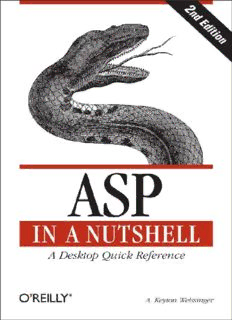
ASP in a Nutshell (In a Nutshell (O'Reilly)) PDF
Preview ASP in a Nutshell (In a Nutshell (O'Reilly))
ASP in a Nutshell, 2nd Edition Table of Contents SPECIAL OFFER: Upgrade this ebook with O’Reilly A Note Regarding Supplemental Files Preface Who Is This Book for? How to Use This Book How This Book Is Structured Conventions Used in This Book Comments and Questions Acknowledgments for the Second Edition Acknowledgments from the First Edition I. Introduction to Active Server Pages 1. Active Server Pages:An Introduction 1.1. The Static Internet 1.2. The Dynamic Internet Part I: CGI Applications 1.3. The Dynamic Internet Part II: ISAPI 1.4. Active Server Pages and Active Server Pages 2.0 1.5. ASP: A Demonstration 1.6. The ASP Object Model 2. Active Server Pages:Server-Side Scripting 2.1. Client-Side Scripting 2.2. Server-Side Scripting 2.3. ASP Functions 2.4. Scripting Languages 3. Extending Active Server Pages II. Object Reference 4. Application Object 4.1. Comments/Troubleshooting 4.2. Collections Reference 4.3. Contents Collection Methods 4.4. Methods Reference 4.5. Events Reference 5. ASPError Object 5.1. Comments/Troubleshooting 5.2. Properties Reference 5.3. ASPError Example 6. ObjectContext Object 6.1. Comments/Troubleshooting 6.2. Methods Reference 6.3. Events Reference 7. Request Object 7.1. How HTTP Works 7.1.1. HTTP: A Simple Example 7.1.2. HTTP Request Types 7.1.3. Form Submission 7.1.4. HTTP Request and Response 7.1.5. The HTTP Request and the ASP Request Object 7.2. The ASP Request Object 7.3. Comments/Troubleshooting 7.4. Properties Reference 7.5. Collections Reference 7.6. Methods Reference 8. Response Object 8.1. Comments/Troubleshooting 8.2. Properties Reference 8.3. Collections Reference 8.4. Methods Reference 9. Server Object 9.1. Comments/Troubleshooting 9.2. Properties Reference 9.3. Methods Reference 10. Session Object 10.1. Comments/Troubleshooting 10.2. Properties Reference 10.3. Collections Reference 10.4. Methods Reference 10.5. Events Reference 11. Preprocessing Directives, Server-Side Includes, and GLOBAL.ASA 11.1. Preprocessing Directives 11.1.1. Preprocessing Directives: Comments/Troubleshooting 11.2. Preprocessing Directives Reference 11.3. Server-Side Includes 11.3.1. Server-Side Includes: Comments/Troubleshooting 11.4. GLOBAL.ASA 11.4.1. GLOBAL.ASA: Comments/Troubleshooting 11.5. GLOBAL.ASA Reference III. Installable Component Reference 12. ActiveX Data Objects 2.6 12.1. Accessory Files/Required DLL Files 12.2. Instantiating Active Data Objects 12.2.1. Example 12.3. Comments/Troubleshooting 12.4. Object Model 12.4.1. Command Object 12.4.2. Connection Object 12.4.3. Error Object 12.4.4. Field Object 12.4.5. Parameter Object 12.4.6. Property Object 12.4.7. Record Object 12.4.8. Recordset 12.4.9. Stream Object 12.5. Properties Reference 12.6. Collections Reference 12.7. Methods Reference 13. Ad Rotator Component 13.1. Accessory Files/Required DLL Files 13.1.1. Adrot.dll 13.1.2. Redirection File 13.1.3. Rotator Schedule File 13.2. Instantiating the Ad Rotator 13.2.1. Example 13.3. Comments/Troubleshooting 13.4. Properties Reference 13.5. Methods Reference 13.6. Ad Rotator Example 14. Browser Capabilities Component 14.1. Accessory Files/Required DLL Files 14.1.1. BrowsCap.dll 14.1.2. BrowsCap.ini 14.2. Instantiating the Browser Capabilities Component 14.2.1. Example 14.3. Comments/Troubleshooting 14.4. Properties Reference 14.5. Retrieving Browser Information from Cookies 15. Collaboration Data Objects for Windows NT Server 15.1. Accessory Files/Required DLL Files 15.2. Instantiating Collaboration Data Objects 15.2.1. Example 15.3. Comments/Troubleshooting 15.4. The CDO Object Model 15.4.1. Common Properties 15.4.2. AddressEntry Object 15.4.3. Attachment Object 15.4.4. Attachments Collection 15.4.5. Folder Object 15.4.6. Message Object 15.4.7. Messages Collection 15.4.8. NewMail Object 15.4.9. Recipient Object 15.4.10. Recipients Collection 15.4.11. Session Object 15.5. NewMail Object Properties Reference 15.6. Methods Reference 16. Content Linking Component 16.1. Accessory Files/Required DLL Files 16.1.1. Netlink.DLL 16.1.2. Content Linking List 16.2. Instantiating a Content Linking Object 16.2.1. Example 16.3. Comments/Troubleshooting 16.4. Methods Reference 16.5. Content Linking Component Example 17. Content Rotator Component 17.1. Accessory Files/Required DLL Files 17.1.1. Controt.DLL 17.1.2. Content Schedule File 17.2. Instantiating the Content Rotator Component 17.2.1. Example 17.3. Comments/Troubleshooting 17.4. Methods Reference 18. Counters Component 18.1. Accessory Files/Required DLL Files 18.2. Instantiating the Counters Component 18.2.1. Example 18.3. Comments/Troubleshooting 18.4. Methods Reference 19. File Access Component 19.1. Accessory Files/Required DLL Files 19.2. Instantiating Installable Components 19.2.1. Example 19.3. Comments/Troubleshooting 19.4. Object Model 19.4.1. Drive Object 19.4.2. Drives Collection 19.4.3. File Object 19.4.4. Files Collection 19.4.5. FileSystemObject Object 19.4.6. Folder Object 19.4.7. Folders Collection 19.4.8. TextStream Object 19.5. Properties Reference 19.6. Methods Reference 20. Logging Utility Component 20.1. Accessory Files/Required DLL Files 20.2. Instantiating the Logging Utility Component 20.2.1. Example 20.3. Comments/Troubleshooting 20.4. Properties Reference 20.5. Methods Reference 20.6. Logging Utility Component Example 21. MyInfo Component 21.1. Accessory Files/Required DLL Files 21.2. Comments/Troubleshooting 21.3. Properties Reference 22. Page Counter Component 22.1. Accessory Files/Required DLL Files 22.2. Instantiating the Page Counter Component 22.2.1. Example 22.3. Comments/Troubleshooting 22.4. Methods Reference 23. Permission Checker Component 23.1. Accessory Files/Required DLL Files 23.2. Instantiating the Permission Checker 23.2.1. Example 23.3. Comments/Troubleshooting 23.4. Methods Reference 24. Tools Component 24.1. Accessory Files/Required DLL Files 24.2. Instantiating the Tools Component 24.2.1. Example 24.3. Comments/Troubleshooting 24.4. Methods Reference IV. Appendixes A. ASP Intrinsic Objects Member Summary B. Converting CGI/WinCGI Applications into ASP Applications B.1. The CGI Application B.2. The Perl CGI Script B.3. The Visual Basic CGI Application B.4. The Active Server Pages B.5. Converting Environment Variables C. ASP on Alternative Platforms C.1. Chili!ASP from Chili!Soft C.1.1. Comments C.1.2. Contact Information C.2. Instant ASP (iASP) from Halcyon Software C.2.1. Comments C.2.2. Contact Information C.3. OpenASP from the ActiveScripting Organization C.3.1. Comments C.3.2. Contact Information D. Configuration of ASP Applications on IIS D.1. Microsoft Management Console and the Metabase D.1.1. ASP Application Configuration D.1.2. ASP Error Handling Configuration SPECIAL OFFER: Upgrade this ebook with O’Reilly ASP in a Nutshell, 2nd Edition Keyton Weissinger Editor Robert Denn Copyright © 2009 O'Reilly Media, Inc. O'Reilly Media SPECIAL OFFER: Upgrade this ebook with O’Reilly Click here for more information on this offer! A Note Regarding Supplemental Files Supplemental files and examples for this book can be found at http://examples.oreilly.com/9781565928435/. Please use a standard desktop web browser to access these files, as they may not be accessible from all ereader devices. All code files or examples referenced in the book will be available online. For physical books that ship with an accompanying disc, whenever possible, we’ve posted all CD/DVD content. Note that while we provide as much of the media content as we are able via free download, we are sometimes limited by licensing restrictions. Please direct any questions or concerns to [email protected].
Description: